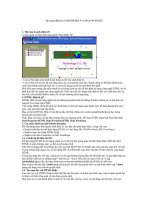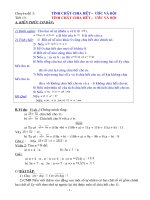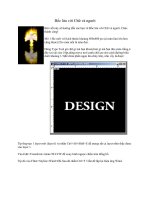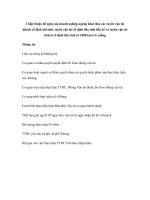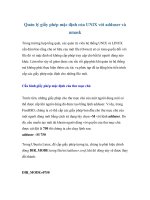Tính từ với ''''-ed'''' và ''''-ing'''' doc
Bạn đang xem bản rút gọn của tài liệu. Xem và tải ngay bản đầy đủ của tài liệu tại đây (156.06 KB, 5 trang )
Tính từ với '-ed' và '-ing'
She was
surprised when she was upgraded to first class.
Khi ta thêm hậu tố "
-ed" và "-ing" vào sau động từ sẽ biến động từ đó thành tính
từ. Nhưng khi nào dùng
-ed khi nào dùng -ing vào sau động từ? Nếu bạn dùng
nhầm thì sẽ rất buồn
cười nhé.
Chỉ có một ít tính từ kết thúc bằng
-ed hoặc -ing nhưng chúng rất phổ biến:
worri
ed/worrying, interested/interesting, excited/exciting
'-ed' adjectives
Giới từ kết thúc bằng
-ed được dùng để nói người ta cảm thấy thế nào:
'She was
surprised to find that she had been upgraded to first class.'
'I was
confused by the findings of the report.'
'She felt tired after working hard all day.'
'-ing' adjectives
Giới từ kết thúc bằng
-ing được dùng để mô tả sự vật hoặc hoàn cảnh như thế nào.
Hãy so sánh những ví dụ dưới đây với những câu ở trên.
'Being upgraded to first class is
surprising.'
The findings of this report are
confusing.'
'Working hard all day is
tiring.'
Bảng ví dụ:
-ed and -ing adjectives tables
Feel '-ed' describe '-ing'
annoyed annoying
bored boring
confused confusing
depressed depressing
excited exciting
frustrated frustrating
frightened frightening
satisfied satisfying
shocked shocking
B
ạn đã nhận ra sự khác nhau chưa? Bạn nhớ dùng tính từ với -ed để chỉ cảm xúc
của con người, còn -ing để mô tả sự vật và hoàn cảnh nhé.
• Dogs often feel ___ during fieworks.
frightening
frightened
• The metro can be ___ the first time you use it.
confusing
confused
• Satoru was ___ to hear about the earthquake.
shocking
shocked
• I think that rainy days in winter are ___.
depressing
depressed
• She's ___ of doing the same thing every day.
boring
bored
• It was the most ___ I have been watching a film.
excited
exciting
• The meals at Immigrant's Cafe are ___.
satisfying
satisfied
